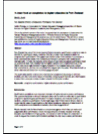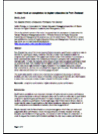New Zealand has one of the lowest reported higher education qualification completion rates in the OECD, significantly below Australia. Why do so many New Zealand students not complete their qualification? This paper looks behind some of the numbers in an attempt to better understand and assess New Zealand's performance compared with Australia and internationally. It looks, for example, at the impact of part-time and partial qualification study on completion rates. New Zealand has the highest reported level of part-time study in the OECD, and one in eight bachelor’s-degree students in New Zealand pass every subject they've enrolled in, yet have not completed their degree after five years. What does this tell us about intentions and about how we should gauge success?
The paper takes another look at some international comparisons focussing on full-time students, and also looks at the impact of transfers, changing qualifications, and what happens to rates when a ten-year window is taken instead of a five-year window.
Purpose
This paper also does not set out to support a case for moving away from qualification completion as an important indicator of system performance, but, rather, it sets out to provide some context on the New Zealand system to those who may use these comparisons to infer something about performance.


